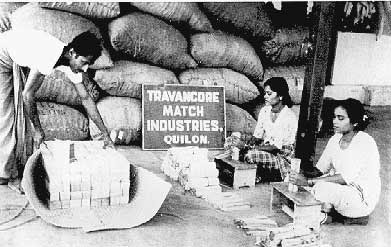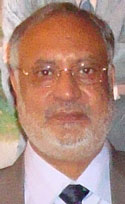SWEDISH SOUTH ASIAN STUDIES NETWORK
Department of Economic History at Stockholm University:
Postal address: Ekonomisk historiska institutionen,
Stockholms universitet, SE-106 91 Stockholm
Visiting address: Frescati house A, Universitetsvägen 10 A,
plan 9
Fax: +46 (0)8 16 81 08
Web page: http://www.ekohist.su.se/
Contact person: PhD Per
Hilding, Director of Studies for International Relations, room
A 930, phone: +46 (0)8 16 47 52.
Personal web page: http://www.ekohist.su.se/pub/jsp/polopoly.jsp?d=14087&a=75838
Research at the department connected to South Asia
 PhD Per
Hilding defended his doctoral dissertation in 1992, ”Technology
in a Controlled Economy – The Match Industry in India”,
on the development of the match industry in India since independence
in 1947 and up to 1985. Comparison
is made between the mechanised and technically advanced part of this
industry, which till recently was dominated by Swedish Match, and handicraft
forms of match production, which predominate amongst domestic enterprises,
especially in Tamil Nadu in southern India.
PhD Per
Hilding defended his doctoral dissertation in 1992, ”Technology
in a Controlled Economy – The Match Industry in India”,
on the development of the match industry in India since independence
in 1947 and up to 1985. Comparison
is made between the mechanised and technically advanced part of this
industry, which till recently was dominated by Swedish Match, and handicraft
forms of match production, which predominate amongst domestic enterprises,
especially in Tamil Nadu in southern India.
Per Hilding is now involved in a comparative
historical study on child labour. The aim is to investigate the impact
of technical developments, government regulations and primary education
on child labour in 19th century Western Europe and present day India.
In November 2005 Dr. Hilding received SEK 2.4 Million as a three-years
grant (2006-08) from Sida/SAREC to coordinate a research project titled ”Helping
or hurting? Policies for combating child labour in hazardous occupations
in India”. More information
about the 2005 Sida grants.
Abstract: The aim of this project is to consider the effects
on child labour of technological development, legislation and the expansion
of elementary education in modern day India in relation to the experience
of 19th century Europe. In recent years the situation and conditions of
child workers in India have been documented and analysed in a number of
research reports and by government commissions. Judging by these studies
child labour appears in a large number of cases to be rooted in pre-industrial
and indeed even pre-capitalist relations, which have survived into modern
times.
The project is carried out in collaboration with Dr. Ranjula Bali Swain,
Dept. of Economics, Uppsala University. More
information about the project.
 He is also engaged in a research project titled ”Workers
and Entrepreneurs in the Sivakasi Match Industry”.
A project on Sivakasi – a crowded and busy small town situated
50 miles south-west of Madurai, which account for the greater part of
India's production of matches, fireworks and printed matters, such as
posters, show-cards, calendars etc. Growth, whether expressed in volume
of production, numbers of firms, employment or sales, has been explosive
during the last few decades. Testimonial evidence indicates that there
is no unemployment in the region and therefore no beggars. Practically
every household, it is claimed, enjoys some form of earned income from
the three main industries in the area: match, fireworks and printing.
The reverse of the medal, however, is to be found in the poor working
conditions, the very low wages and the widespread use of child and female
labour. The child labour force in Sivakasi and the surrounding area is
estimated at nearly 125 000, perhaps the largest single concentration
of child labour in the world. The vast majority of the child labourers
in the match industry are girls. They are forced to work in order to
earn their livelihood and to save for their dowry. Boys are also employed
in the match industry, but most of them work in the fireworks and printing
industries as helpers, carriers and so on.
He is also engaged in a research project titled ”Workers
and Entrepreneurs in the Sivakasi Match Industry”.
A project on Sivakasi – a crowded and busy small town situated
50 miles south-west of Madurai, which account for the greater part of
India's production of matches, fireworks and printed matters, such as
posters, show-cards, calendars etc. Growth, whether expressed in volume
of production, numbers of firms, employment or sales, has been explosive
during the last few decades. Testimonial evidence indicates that there
is no unemployment in the region and therefore no beggars. Practically
every household, it is claimed, enjoys some form of earned income from
the three main industries in the area: match, fireworks and printing.
The reverse of the medal, however, is to be found in the poor working
conditions, the very low wages and the widespread use of child and female
labour. The child labour force in Sivakasi and the surrounding area is
estimated at nearly 125 000, perhaps the largest single concentration
of child labour in the world. The vast majority of the child labourers
in the match industry are girls. They are forced to work in order to
earn their livelihood and to save for their dowry. Boys are also employed
in the match industry, but most of them work in the fireworks and printing
industries as helpers, carriers and so on.
In January 2003, Per Hilding presented this project at the Development
studies research conference at Lund University (read
an abstract).
Other similar research projects by Per Hilding:
• ”Child labour in the Indian Match Industry”. A project dealing with the development of the match industry in India since 1922 and up to today. Comparison is made between the mechanised and technically advanced part of this industry, which till recently was dominated by Swedish Match, and handicraft forms of match production, which predominate amongst domestic enterprises, especially in Tamil Nadu in southern India. A prime aim of the project is to seek an explanation for the conditions which favour the spread of pre-modern technology despite competition from modern mechanised production techniques. Industrial policy provides part of the answer. Issues of employment and regional policy led the Indian government to encourage labour intensive methods of production while restraining mechanised manufacturing.
The project is approaching completion and the result will soon be published in a monograph entitled ”Storm in a Matchbox: Entrepreneurship and Child Labour in the Indian Match Industry”, which is a sequel to Hilding’s doctoral dissertation ”Technology in a Controlled Economy – The match Industry in India”, Curzon press 1992.• ”Child Labour in Present-day India in Comparative Historical Perspective”. The aim of this project is to consider the effects on child labour of technological development, legislation and the expansion of elementary education in some industries in modern day India in relation to the experience of 19th century Europe. A comparison with conditions in Western Europe during the growth of the factory system ought therefore to clarify specific characteristics in Indian development. Several hypotheses intended to account for the disappearance of child labour in the European factory system have been propounded by academic studies. Some researchers have focused on the sphere of production, arguing for a relationship between technological development and the decline of child labour. Others hold that the causes are more likely to be found in changes in the social structure and regard child labour as an integral part of working-class life and culture. Still others point to altered attitudes and values which were expressed in legislation against child labour and the introduction of compulsory schooling. It should be possible to test hypotheses regarding the reasons for the disappearance of child labour against the reality of the India of our own time. In this way factors favourable and unfavourable for the abolition of child labour may more easily be identified. (Grant from Sida).
Other South Asia related activities
Per Hilding is the convenor of the International Relations Seminar that was formed at Stockholm University in the Spring 2003. The purpose of the seminar is to serve as an interdisciplinary forum for discussions, cooperation and interchange of ideas between researchers and research departments in the Stockholm area. More information.
The department has established a collaboration with the
Centre for the Study of Regional Development at Jawaharlal Nehru University
(JNU). New Delhi, India. Sukhadeo Thorat,
Professor of Economics is the main contact peerson at JNU. He supervised
Maria Engman’s dissertation, see above, and he has also been
the main academic supervisor for Eva-Maria Hardtman who defended her
dissertation at the Dept. of Social Anthropology,
Stockholm University, in the Fall 2003, on a topic concerning the
Dalit situation in India (Our Fury is Burning:
Local Practise and Global Connections in the Dalit Movement).
Sukhadeo Thorat is Professor in Economics at the Center for the Study
of Regional Development, School of Social Sciences, Jawaharlal Nehru University
in Delhi. In his research he has specialized on Agricultural development,
economic institutions and development, poverty, labour studies, agrarian
structure, caste and economic discrimination (particularly labour market
discrimination), economic problems of schedule castes and schedule tribes,
economic ideas of Dr. Ambedkar, human rights and urban slum.
Collaboration with JNU
Since 2007, the Dept. of Economic History is involved
in a Linnaeus Palme exchange programme with the School
of International Studies at Jawaharlal Nehru University in
New Delhi, India. More information
about the Linnaeus Palme programme, administered by the International Programme Office
for Education and Training but financed by Sida.
The project has received continued funding for the period 2009-10. More information about the South Asia related Linnaeus Palme projects for 2009-10.
 An outcome of the close collaboration with JNU, a formal agreement on collaboration (MoU) between Stockholm University
and JNU was signed in 2008. The agreement covers a wide range of disciplines, including Political Science, Environmental Studies, Energy and Security, Social Anthropology, Physical and Human Geography and Regional Development, Gender Studies, Central and South Asian Studies, Economic History and International Relations, and International Law. Psychology, History, and Sociolinguistics may also be included. Dr. Per Hilding initiated the collaboration agreement during a visit to JNU in March 2008. This was followed by a visit to Stockholm by Prof. Harjit Singh (photo to the right), Dean for the School of Social Sciences at JNU, in the middle of September 2008. There he met with Stockholm University (SU) Vice-Chancellor Kåre Bremer and other high-profile representatives of SU to discuss the exact forms for the collaboration – that will not only focus on students and teachers exchange, but also include common activities such as joint conferences, seminars and research projects. In March 2009, Kåre Bremer visited JNU to sign the formal MoU on collaboration. More information.
An outcome of the close collaboration with JNU, a formal agreement on collaboration (MoU) between Stockholm University
and JNU was signed in 2008. The agreement covers a wide range of disciplines, including Political Science, Environmental Studies, Energy and Security, Social Anthropology, Physical and Human Geography and Regional Development, Gender Studies, Central and South Asian Studies, Economic History and International Relations, and International Law. Psychology, History, and Sociolinguistics may also be included. Dr. Per Hilding initiated the collaboration agreement during a visit to JNU in March 2008. This was followed by a visit to Stockholm by Prof. Harjit Singh (photo to the right), Dean for the School of Social Sciences at JNU, in the middle of September 2008. There he met with Stockholm University (SU) Vice-Chancellor Kåre Bremer and other high-profile representatives of SU to discuss the exact forms for the collaboration – that will not only focus on students and teachers exchange, but also include common activities such as joint conferences, seminars and research projects. In March 2009, Kåre Bremer visited JNU to sign the formal MoU on collaboration. More information.
This was followed up by a visit to Stockholm by Prof. B B Bhattacharya, Vice Chancellor at JNU, in October 2009, when a new agreement on a student exchange programme was signed.![]()
Other institutes and institutions that the Dept. of Economic History
co-operates include:
Amsterdam School of Social Science
Research, Amsterdam;
Centre
for the Study of Regional Development, Jawaharlal Nehru University,
New Delhi;
Madurai Kamaraj University,
Madurai;
Madras
Institute of Development Studies, Chennai;
Research Centre for Women's Studies, Mumbai.
SASNET - Swedish South Asian Studies Network/Lund
University
Address: Scheelevägen 15 D, SE-223 70 Lund, Sweden
Phone: +46 46 222 73 40
Webmaster: Lars Eklund
Last updated
2010-03-10
